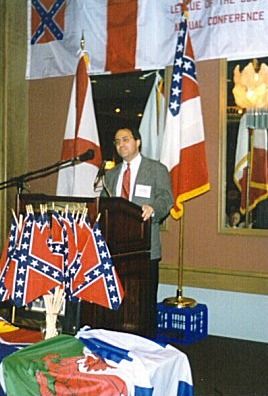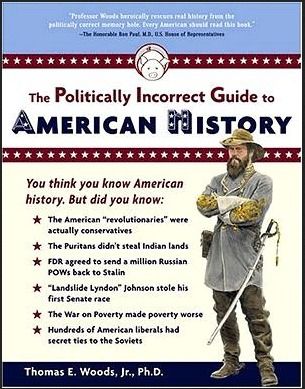|
Thomas E. Woods, Jr.'s Long and Winding "Yawn"
"It's the same arguments every time," he fumes. "They pretend I haven't answered them. I have." But has he really answered me, or anyone else? Or are his answers really more like deflections? There are good reasons why he is described as a neo-Confederate. Let's look at a few. Woods knows that many of his clearly neo-Confederate ideas and purposeful involvements will make other of his allies uncomfortable at best, especially among the Catholic Right. So his ideas and involvements must be hidden or downplayed and when they cannot be, they are strenuously denied. Woods claims that he is really just a libertarian. But that is a canard. Most of us know libertarians. And while we may disagree with them on many issues, especially economics, we know that they are not advocating the breakup of United States of America. Woods insinuated in his response that I have equated his calls for secession and nullification with racism and a call to reestablish slavery, hence, why I call him a neo-Confederate. I did no such thing, of course, and all he has for an argument is to lump me in with other unnamed critics, complaining, "They idiotically call me a "neo-Confederate" (have they really not seen the zombie video, or are they trying to caricature themselves?)." Woods would have us believe that this video answers all of his critics about everything. (It would be better titled "The Zombie Straw Man.") Using the setting of a mock interview to discuss his book, Nullification: How to Resist Federal Tyranny in the 21st Century, he starts out by saying that the federal government does whatever wants without constitutional restraint. Of course he does not specify exactly what the government is doing that requires restraining. He goes on to claim that if anyone questions the constitutionality of a given issue, "they laugh you." Paraphrasing Jerry Seinfeld, who are all these people who are laughing? Of course, he does not say. This is, after all, a straw man he is pummeling. As the video churns on we see the zombie "host" throw accusations of "slavery" and "neo-Confederate" at Woods, as if those of us who use this moniker to define him do so baselessly. But perhaps unsurprisingly, he engages in the very behavior of which he accuses his critics -- falsely (and absurdly) equating those who oppose nullification and secession with Hitler. He never addresses the real reason why he's fairly described as a neo-Confederate: it is the content of his own works and his involvement in neo-Confederate organizations. Let's look at a standard definition of the term: The Southern Poverty Law Center defines it this way: The term neo-Confederacy is used to describe twentieth and twenty-first century revivals of pro-Confederate sentiment in the United States. Strongly nativist and advocating measures to end immigration, neo-Confederacy claims to pursue Christianity and heritage and other supposedly fundamental values that modern Americans are seen to have abandoned. So even the SPLC does not say one has to advocate slavery or even be an overt racist to be a neo-Confederate. But one does not have to look very hard to see what the League is all about. A current visitor to the League's web site will find a close-out special on League of the South tee-shirt with a quote from Confederate General Nathan Bedford Forrest (the first Grand Wizard of the Ku Klux Klan) on the back. And if you need a bumper sticker to express your feelings about secession, you might pick "Feds Out of Dixie!". And after making your purchases you can keep up with the cause on the League of the South blog, Rebellion. In fairness, Woods once stated, "I have played no day-to-day role in the [League of the South] organization and I am responsible neither for the comments of any other member nor for the politically incorrect statements I am told can be found on the League's site." But with that said, nowhere in that statement, or any other statement he has made to my knowledge, does he actually separate his views from those of the League. And although Woods acknowledges that he was present at the League's formative meetings, he also claims not to completely identify with the League's core beliefs. But he does not say which ones or why. There is much more eye opening material in the League's core beliefs, which are laced with exclusionary statements, such as:
"The League of the South asserts that Southern society is radically different from the society impressed upon it by an alien occupier." Woods is more than a contemporary fashionista of secession and nullification. He is a leader who puts an Ivy League gloss on some crude and discredited ideas, and even cruder and more discredited proponents of these ideas. Indeed, for a man who says he is not a neo-Confederate because he is not a racist and does not believe in slavery, he is having a hard time explaining his relationship with the League of the South, a leading apologist for the Southern Cause. But one does not have to rely entirely on Woods's involvement with the League as evidence of his neo-Confederate commitments. He is also involved with the Abbeville Institute (taking its name from the birthplace of secessionist John C. Calhoun). As my Talk to Action colleague Rachel Tabachnick has already noted:
Woods is from Massachusetts with degrees from Harvard and Columbia, but he has described himself as one of "the founders of the League of the South." He is also affiliated with the Abbeville Institute, described by the Chronicle of Higher Education as a group of 64 scholars nostalgic for the Old South and Secession. Time Magazine described the institute, founded by Emory University professor Donald Livingston, as a group of "Lincoln loathers." The Southern Poverty Law Center has listed the Abbeville Institute founder as one of the leaders in the modern neo-Confederate movement and, as described in a Chronicle of Higher Education article, pointed out the following quote in its mission statement.
Union General Joshua Lawrence Chamberlain once adroitly observed:
"There was no war between the States. It was a war in the name of certain States to destroy the political existence of the United States, in membership of which alone, on any just theory of the government, their own sovereignty as States inhered, and could make itself effectual. To this absurd pass did that false theory come -- a war of States against the people; and if successful, the suicide of States." Indeed, this book cements his credentials as a neo-Confederate, starting with the cover art. There we see a smug looking Confederate officer standing with his arms almost folded with an "I-told-you-so" look on his face. But finally there is Woods’s 1997 article in The Southern Partisan magazine entitled, “Christendom's Last Stand” where Woods, who described himself as “a founding member of the League of the South,” enthusiastically waved the flag of his neo-Confederatism: So the War Between the States, far from a conflict over mere material interests, was for the South a struggle against an atheistic individualism and an unrelenting rationalism in politics and religion, in favor of a Christian understanding of authority, social order and theology itself. The intelligent Left knows this, and even the incurably stupid, like [former Democratic Senator from Illinois -- the first African-American woman to be elected as a U.S. Senator] Carol Moseley-Braun, must at least sense it. For all their ignorant blather about slavery and civil rights, what truly enrages most liberals about the Confederate Battle Flag is its message of defiance. They see in it the remnants of a traditional society determined to resist cultural and political homogenization, and refusing to be steamrolled by the forces of progress.And that is why Thomas E. Woods, Jr. has earned the description of neo-Confederate. This post was updated a few hours after it was first posted.
Thomas E. Woods, Jr.'s Long and Winding "Yawn" | 7 comments (7 topical, 0 hidden)
Thomas E. Woods, Jr.'s Long and Winding "Yawn" | 7 comments (7 topical, 0 hidden)
|
||||||||||||
| ||||||||||||




 print page
print page "Apparently there's been a series against me over at the Daily Kos by a left-liberal lawyer," neo-Confederate author Thomas E. Woods Jr. recently wrote in a blog post titled, "Left-Wingers Attack; I Yawn."
"Apparently there's been a series against me over at the Daily Kos by a left-liberal lawyer," neo-Confederate author Thomas E. Woods Jr. recently wrote in a blog post titled, "Left-Wingers Attack; I Yawn." There is also Woods's book
There is also Woods's book